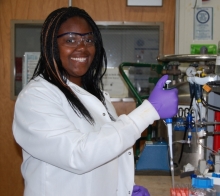
Major:
University:
Mentor(s):
Faculty Sponsor(s):
Faculty Sponsor's Department(s):
Project Title:
Project Description:
Liposomes, tiny vesicles comprised of a phospholipid bilayer membrane, have promise in the area of cancer research as possible drug carriers in tumor chemotherapy. However, past research has shown liposomes to not only have poor stability, leading to premature drug leakage, but short circulation lifetimes as drug carriers. Thus the goals of this research were to synthesize liposomes at different lysolipid compositions to observe stability of vesicles around body temperature. We also wanted to attach polyethylene glycol (PEG) to outer liposomal bilayer which past research has shown to increase circulation of liposomes in the body. Four liposome vesicles were synthesized with different compositions of the lysolipid monopalmitoylphosphatidylcholine (MPPC) which is unique in having one hydrocarbon tail group as opposed to two tail groups. Liposome samples were infused with a fluorescent dye carboxy flourescein and tested using fluorescent spectroscopy to observe release of dye at temperatures ranging from 36 - 45oC. Confocal laser scanning microscopy was used to image PEG attachment to liposome samples. Data from fluorescent spectroscopy showed greater dye release with increasing temperature. Increasing the MPPC content lead to greater release at temperatures above 37o C while also maintaining equivalent release at 37o C. Results suggest that MPPC decreases membrane stability and increases overall release. Microscopy showed minimal attachment of PEG to liposome membrane suggesting that alternative methods must be developed to improve PEG attachment to the outer bilayer of the liposomes. This research will offer more information to further drug delivery research using temperature sensitive liposomes.
